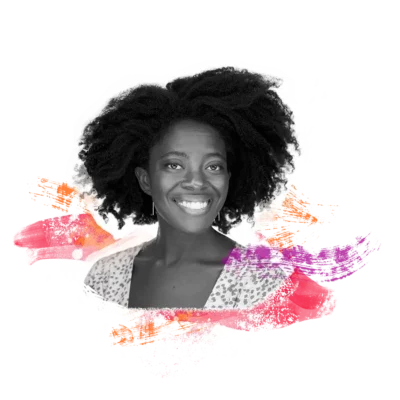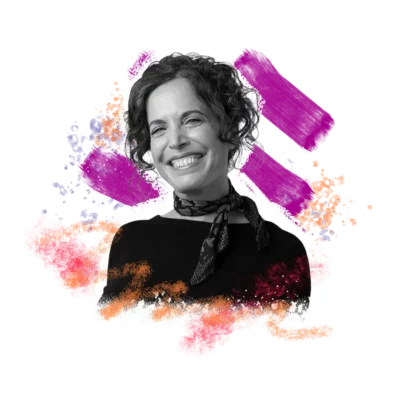Create the conditions for your own creativity
To make a creative leap, get to know your creative self. After publishing a blockbuster first novel, “Homegoing,” followed by a year of touring (and trying to write in hotel rooms), author Yaa Gyasi realized she needed two things to reconnect with her next story: space and time. She shares the creation process of “Transcendent Kingdom” : how she got started, how she gave herself permission to pause – and how to get the feedback she needed.
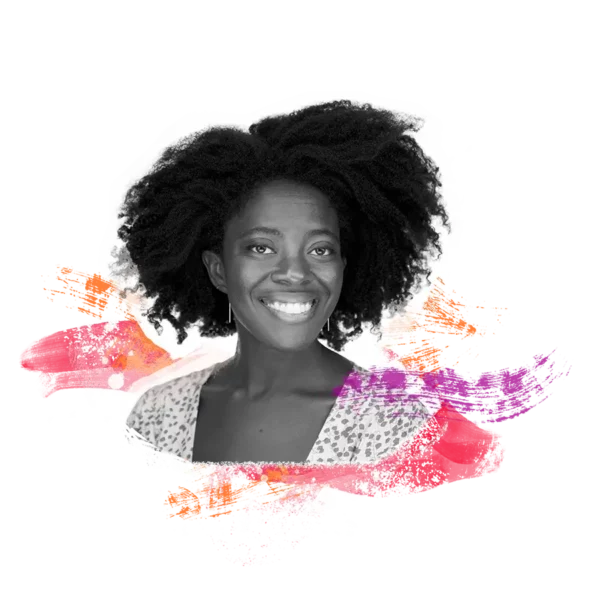
Transcript
Table of Contents:
- Chapter 1: In my own shadow
- Chapter 2: The book I gave up on.
- Chapter 3: Rescuing a forgotten idea.
- Chapter 4: Writing the first chapter.
- Chapter 5: Far from the noise.
- Chapter 6: Looking in the mirror.
- Chapter 7: A game of Jenga.
- Chapter 8: The fragile first draft.
- Chapter 9: When you don’t know what comes next, have faith.
Transcript:
Create the conditions for your own creativity
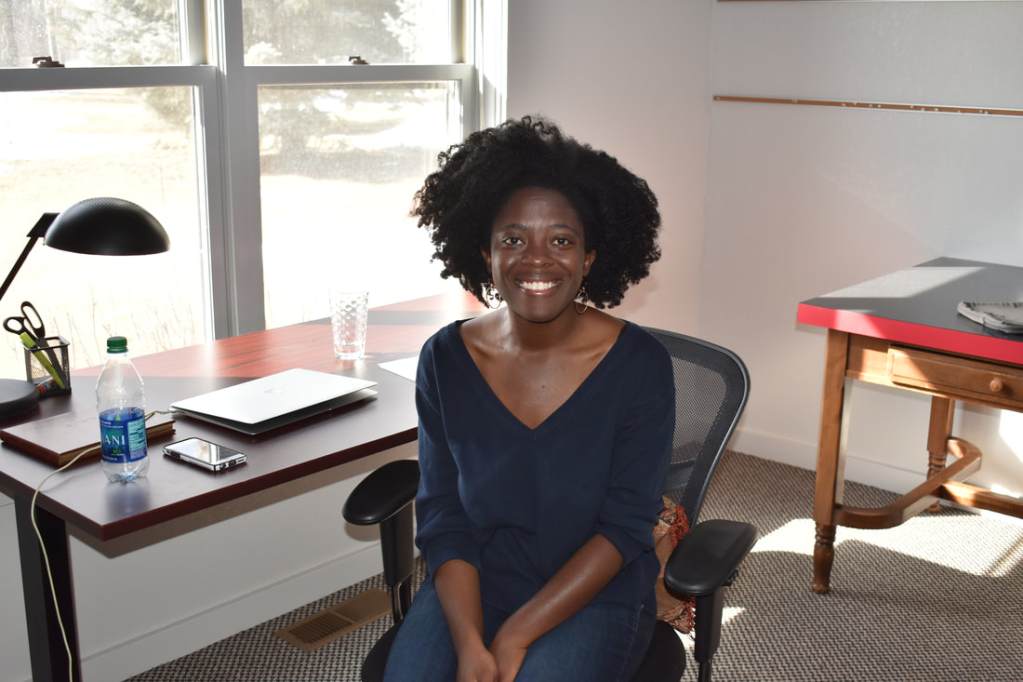
Yaa Gyasi sits at her writing desk at the Ucross Foundation, in Wyoming, where she found space in the wide-open landscape to begin her next book. Photo courtesy Ucross Foundation.
Chapter 1: In my own shadow
YAA GYASI: There was some time after Homegoing, where I wasn’t really writing where I was wondering if it was even possible to start something again, that would take years of my life. And would I be able to see it through?
Homegoing was so beloved by so many people, I knew that this book was going to be really different from Homegoing in a lot of ways. I was worried that the difference between these two books would lead people to not have that same feeling.
JUNE COHEN: That’s Yaa Gyasi, and she’s about to tell us the story of writing her second novel, Transcendent Kingdom, after her first novel, Homegoing, was a beloved, best-selling hit.
It’s a specific story about a writer approaching her second book. But it’s also a universal story of finding the courage and conviction to make a creative leap. And insisting on the exact conditions that allow your creativity to flourish.
As Yaa takes us on the journey of writing Transcendent Kingdom, you’ll hear her make creative choices that defy conventional wisdom – from how she gets started, to when she lets others in on her work, to how she decides when to give up.
And here’s what you need to know about Yaa Gyasi: Her first novel, Homegoing, was a genre-defining work set in two continents, spanning eight generations and 300 years. Yaa sold it when she was 25. Transcendent Kingdom is completely different in tone and scope: It’s an introspective story of a woman, Gifty, who’s the daughter of Ghanain immigrants, who grew up in Huntsville, Alabama, and who studies at Stanford. Yaa herself is the daughter of Ghanain immigrants, who grew up in Huntsville, Alabama, and studied at Stanford.
This story was created from an interview recorded during the pandemic, from Yaa’s home in Brooklyn. In the background, you’ll occasionally hear her dog bark. The piano you’ll hear is our composer Hil Jaeger, who’s playing along with this story. And for visuals while you’re listening, go to sparkandfire.com/kingdom.
[Theme music]
Chapter 2: The book I gave up on
What do you do if the conditions for creativity aren’t right? You can always just stop.
YAA GYASI: During the Homegoing tour the conditions of my life were so different from the conditions that I usually write under. I’d had this thing that I was working on, I don’t think it had a title. I had a lot of frustrated writing days. I would sit down at the desks of hotel rooms, and every time I went to write this thing, it didn’t grab me, it didn’t hold me. And I didn’t really know why. I didn’t know if it was because it wasn’t very good or if it was because my life had changed so significantly that I just couldn’t get quiet enough to feel the book, to feel when it wanted to be. I decided just to give up, and not attempt to write while on tour.
I had spent so much of my life always working on something, telling myself not to write – that just felt foreign, it didn’t feel like the version of me as a writer that I understood. But it just felt to do anything otherwise would lead me to a book that didn’t feel like me because it would have been emerging from this state of anxiety.
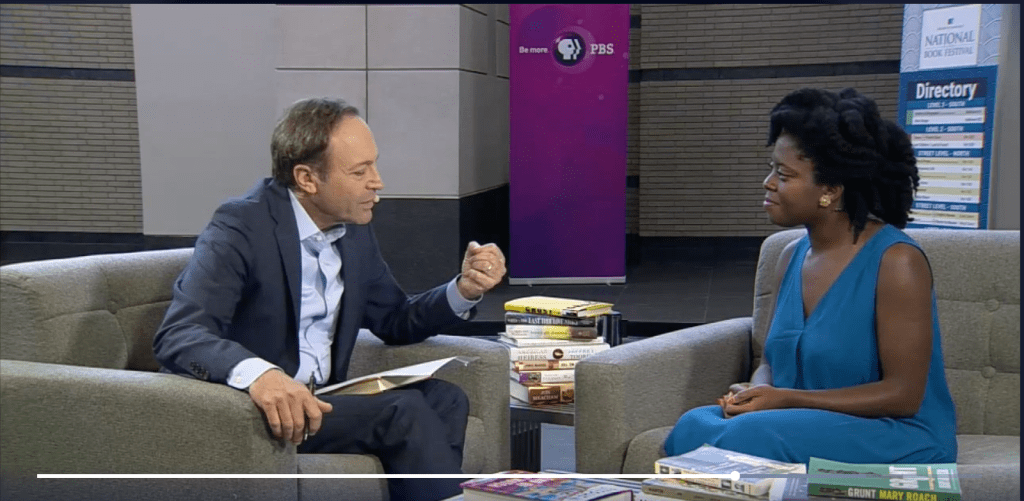
In the year after “Homegoing” was published, Yaa Gyasi seemed to be on perpetual book tour. Here she speaks with Jeffrey Brown of PBS NewsHour at the National Book Festival.
Chapter 3: Rescuing a forgotten idea
YAA GYASI: Initially, when I started writing Transcendent Kingdom I remembered a short story that I wrote after I finished a first draft of Homegoing. Homegoing was a novel that covered 300 or so years of history. It was written in the third person. It had 14 point-of-view characters.
I had set that aside, and I wanted to work on something that was completely different. “Inscape” was a short story that was written in the first person that covered no more than a week of a woman’s life and was set in one place. So it felt, from a craft perspective, to be about as different as two things could get.
There was relief that I could remember how to tell a story simply without the need for research, that I could get back to that place where writing just felt kind of effortless. I kind of set that story aside for many years, as I returned to Homegoing, and Homegoing took off, and I forgot all about the story. But the thing that I kept returning to was the voice of the story. I wanted to explore that relationship between a woman who’s intensely intellectual, academic, trying to relate to her very religious mother. And I think that’s why I wanted to return to it.
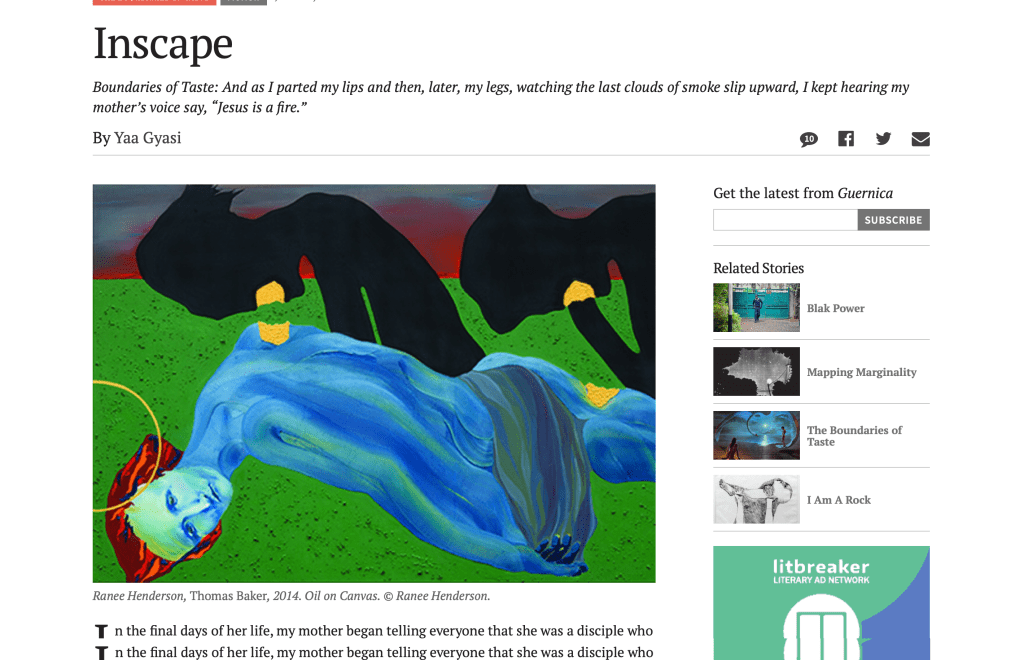
The title page of “Inscape,” Yaa’s 2015 short story as published in Guernica. Features the painting “Thomas Baker,” 2014, by Ranee Henderson. Click to read the full story.
Chapter 4: Writing the first chapter
How do you begin when the path isn’t clear? Find a single compass point.
YAA GYASI: The first writing session for Transcendent Kingdom, I lived on Bergen Street and Prospect Heights in Brooklyn, there were police cars going up and down the street at all hours. I was at this ladder desk by a window. I was on the top floor. So mostly what I looked out on directly was the Doughnut Plant, where you could go in and buy very fancy donuts.
I knew that I was writing a novel. I knew that I wanted to write something in the first person, to write a book about difficult mother-daughter relationships, the ways that mental health and culture are linked. I knew that I wanted it to have this feel of cascading flashbacks that were built around this one sentence early on in the novel where Gifty says: “There used to be four of us, then three, then two, if my mother goes, whether by choice or not, there will only be one.”
And I was using that as a way of thinking about the flashbacks. So in the beginning of the novel, you get to see the flashbacks center around the family of four, and then they concentrate around Gifty and her brother and mother, and then it’s just Gifty and her mother, and the novel ends with just Gifty. And that’s how I was thinking about the non-linearity of the novel, that there would be this kind of logic of diminishing family to it. But beyond that, I didn’t really have much to guide me.
The first chapter felt like it just poured out of me. I could see it really clearly, and it’s almost word for word what it was that day that I wrote it. And once I had that first chapter, I knew that I was in it.
JUNE COHEN: Did you notice what Yaa didn’t do at the beginning of this chapter? She didn’t write an outline, which might be a more conventional way to write a complex book. Yaa started with just a sentence and her principles to guide her. It isn’t a solution for everyone. But for her, a single compass point was enough to begin.
Chapter 5: Far from the noise
How do you take a project to the next level? Sometimes you need to get quiet.
YAA GYASI: I had never done a fellowship before. I was offered this one at Ucross in Wyoming, which has a population of 25 people. So it was very barren, there was nothing to see as far as your eyes could wander other than this flat expanse and snow, with some mountains off in the distance. There is a house where the fellows lived and slept. I would wake up and walk through the snow to my little cabin that I shared with another writer. It was about a 10-minute walk where I could think about what I wanted to do for the day, what my goals were. There was something really nice about having that walk to work that made it feel as though you needed to turn something on.
It was my first time having a separate office that was outside of my living space. I had a desk underneath the window that faced out into this little stream. The landscape was pretty serene, very snowy, and very still.
I would write into the afternoon, stopping for lunch. You would get lunch brought to your door, but they wouldn’t knock on your door so as not to disturb you, and then I would head back to my room, and I’d have dinner with the fellows.
The barrenness helped my concentration, especially coming off of life in the city. I think there is something really helpful about moving at a slower pace.
JUNE COHEN: As Yaa described her Western writing retreat, did you find yourself a bit envious? Or the opposite? Is the idea of that much quiet oppressive to you? Whatever your reaction, that’s a clue from your creative center – hinting at the conditions under which your creativity will thrive.
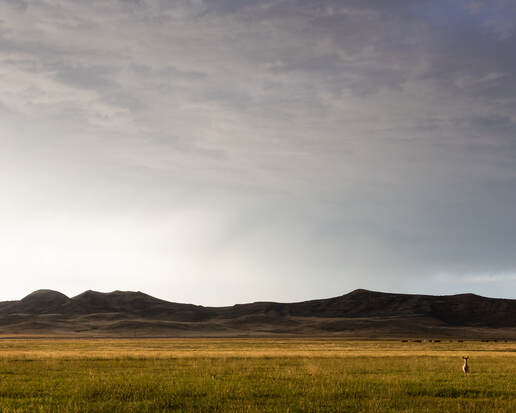
The view across the plains at Ucross Foundation in Wyoming. Photo by Jennifer Garza-Cuen, courtesy Ucross Foundation
Chapter 6: Looking in the mirror
How can you draw on your life without exposing your life? Use your experience as a scaffolding, to hold the story up.
YAA GYASI: I wanted it to read like a memoir. I was thinking about how people relate the story of their lives to others, what they leave out, what they share, why they share it, and when they share it. I was also drawing on places that I knew, Huntsville, Alabama is where I spent most of my childhood, and Stanford, where I went to undergrad.
Part of the reason why I write about religion is because I, myself, was raised in the church. I was raised Pentecostal, and similarly to Gifty, I was raised in a predominantly white church in Huntsville, Alabama. And that experience was a very fraught one for me, and it’s one that I’m often returning to and trying to grapple with. And so I knew that I was going to be drawing from that particular well – my own religious past and what it left me with through this book and through this character.
Many people who have gone to evangelical churches across the country, but certainly in the south, will recognize some of those ways of speaking, some of those turns of phrases. There’s a way of ending a sentence with amen, with a question mark, that I think is kind of unique to evangelical churches. You say “God is good, amen?” Like you’re supposed to answer that as a question.
There’s this sense that Gifty comes to at the end of the novel, where she is able to accept that there are things for which she will never have answers. I don’t know that I come to that same place after finishing the novel, but I do feel less of that anxiety around these questions that I’ve had. I do feel more at ease to lay that subject matter down.
I think of the autobiographical elements that writers use in their novels as really kind of a scaffolding that you use to build something around. And sometimes you don’t really need it, but in the process of writing it holds something up that I find really helpful. If it is like looking in a mirror, it’s like looking in a funhouse mirror. By the end of it, it doesn’t look like you at all, and so it’s hard for me ever to say that something I wrote is autobiographical because I can’t really recognize what parts of myself are in it.
Chapter 7: A game of Jenga
How do you keep a complex project from collapsing? Just keep it together, any imperfect way you can.
YAA GYASI: I never felt stuck, I never felt like writer’s block, I just felt like there is danger of it all falling apart. Coming off of a book like Homegoing, which had a really tight structure, Transcendent Kingdom felt like a game of Jenga – where if I changed one thing, the entire novel might collapse. That was the hardest part. And there were moments during the revision process where I thought I wasn’t going to figure out how to switch things around without having the whole thing collapse.
I wrote this novel straight through jumping back and forth in time. The first draft was very non-linear. It was after I got notes from my editor who wanted there to be more sustained continuity in some of the sections that I had to reorganize. And as I revised, I tried to have there be more continuity, more moments where you stay within a particular time period.
I’m not a very visual thinker, though I know there’s a version of this process that looks like having colored note cards out that you rearrange, that would have been a good way to approach it. I just had lists where I would list all of the scenes that take place in Gifty’s life, in elementary school and then all of the scenes that take place in middle school and high school, her college years. I put the scenes according to those categories and then tried to find moments in the present storyline that drew from these moments in her past.
Chapter 8: The fragile first draft
When do you invite feedback on your work? When you know for yourself what you’re trying to do.
YAA GYASI: I’m pretty guarded with my work during a first draft because I want to see what it is for myself first, before I start inviting other voices in. I want to have a good sense of what I’m trying to do, what I want the book to look like, and be able to articulate those things to myself before I even get notes from anyone else.
It’s just my own fragility about whether or not something is good. I find it really hard to tell if I’m on the right track, if I’m approaching my own goals for a piece of writing, until I finish the first draft. And so in that kind of fragile state of not knowing even for myself, if it’s right, if it’s good, if I get feedback at that point, that’s like, “This isn’t any good,” I think the danger for me is that I’ll just throw it out or set it aside entirely before I have finished it to see for myself if I can pull it off.
I did share parts of Homegoing in a workshop when I was a student at Iowa. And I remember getting feedback just based on a chapter or two that the timeline was too large, and it wouldn’t work. Luckily I did not listen to that, but I think a younger version of me would have heard something like that and abandoned the project altogether.
When I finished a first draft, I gave it to my partner, who is a phenomenal reader. And he gave me his notes, which is what I used to write the second draft. By the time I do get feedback, I’m often pretty clear on which things align with my vision for the book. Usually I know what needs work, I just want to hear options for how to work around those areas. And if someone’s notes don’t feel as though they’re getting to the heart of what I’m trying to do, over the years I’ve just become better at setting those notes aside.
JUNE COHEN: Did you notice the tone in Yaa’s voice when she mentions being guarded with her work? You can tell she’s had a lot of pressure to share things before she was ready. And she knows that for her, the creative process is like a cocoon – open it too early and the butterfly won’t fly. And that’s not true for everyone. What matters is knowing for yourself when you need feedback.
Chapter 9: When you don’t know what comes next, have faith
YAA GYASI: Going back to this question of my religious upbringing, there’s something about that that informs the way that I think about work. If I stay open, if I have faith, that something will come of this fallow time, that that faith will be rewarded. Just to follow my intuition and to stay open to whatever it is that might arrive.
There are days where I’m not sure that that faith will be rewarded, where I’m not sure if what I’m working on is any good, or even before I start working there are days when I’m not sure that I’m going to want to return to the page, or that I will have anything to say.
I don’t know how I get through those days other than to remember all of the times where that faith has been met, where I have had doubts and been able to overcome those doubts, to hope that those times will return.
JUNE COHEN: I want to thank Yaa for sharing the story of this creative journey with us. And I want to thank each of you for listening. I hope you found things in it that you can bring into your own work.
Whether it’s the way Yaa had the courage to make a creative leap, and do something entirely different or the way she uses her own life as a sort of scaffolding for her work, and builds around it. It might be her description of that writing retreat in Wyoming – with its quiet, focused space to work. Or it might just be the way Yaa holds on to her work until she’s ready to share it – one of the many ways she consistently, quietly creates the conditions that allow her own creativity to thrive.
